|
De Oostenrijkse dichteres en schrijfster Ingrid Puganigg werd op 22 januari 1947 geboren in Gassen bij Afritz am See, Kärnten. Zie ook alle tags voor Ingrid Puganigg op dit blog.
Uit: Zwei Frauen warten auf eine Gelegenheit.(Samen met Monika Helfer)
Ich ging vom Over Cliff Drive in Southbourne hinunter zum Strand. In der Ferne sah ich einen Mann mit einem Kampfhund. Etwas stimmte nicht mit de beiden. Entweder war der Mann betrunken oder der Hund gehorchte einfach nicht mehr.
Ich eilte zum Fisherman’s Walk. Dort gibt es direkt am Cliff einen Aufzug. Ich stieg ein und fuhr hinauf zum Café Riva. Dort trank ich einen Espresso und dachte an die junge Frau, die sich ein paar Meter von hier mit Nikotin umgebracht hat. Im Krankenhaus, in das man sie brachte, nachdem Leute sie gefunden hatten, war sie noch einmal kurz bei Bewusstsein, riss die Sauerstoffmaske vom Gesicht und flehte um ihr Leben.
Über sie, die Freundin meiner Tochter, habe ich angefangen, einen Roman zu schreiben.
Fünfzigmal. Hundertmal.
Irgendwann fängt man an, über etwas zu schreiben. Schreibt jedenTag. Macht denText aber nie fertig, weil das, worüber man schreibt, nie enden soll.
Meine Tochter Ruth lebt seit über zwanzig Jahren in Dorset, Südengland.
Einmal stiegen wir auf den Hengistbury Head. Eine hügelige Landspitze bei Bournemouth.
Obwohl Anfang November, war es weder neblig noch kalt. Aber menschenleer. Gegen Abend, es dämmerte schon, kamen wir an ein kleines Moor. Umgeben von Gestrüpp. Darauf lagen ausgebreitet Jeans, Hemd, ein Schuh, ein Rucksack.
Wir dachten, jemand sei ermordet worden oder im Moor untergegangen.
Das hat sich nie aufgelöst.“
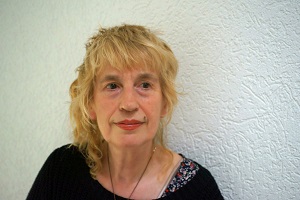
Ingrid Puganigg (Gassen, 22 januari 1947)
De Franse kunstschilder, dichter en schrijver Francis Picabia werd geboren in Parijs op 22 januari 1879. Zie ook alle tags voor Francis Picabia op dit blog.
Pape religieux
Merveilles naturelles plage de sable isolée
sous forme colossale pleine de calme utile.
Ce soir la crainte salutaire déguise la vérité
en croisant les jambes
la queue. —
Ma maladie squelette de souvenirs
se dresse à coup sûr en ennemi insupportable
où le singe fait des raisonnements subtils
mentalement.
Le trappeur désarme la philosophie intriguée
sur la grève articulée des choses.
Je crois à mon image.
C'est un système final
car vous pensez en chinois libre.
Infini du monde effrayant
vibrations voisines
vallée prodigieuse
devenir fou et ainsi de suite.
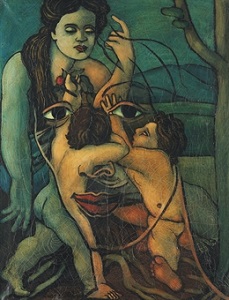
Geminis, 1936
Cri
Le matelas est probablement une langue
plus incrédule peut-être
le décès la glu visiteurs
Captifs dans l'antichambre
des magazines sur le sommeil
de mise en scène —
Le point sensible dévore
sans espoir —
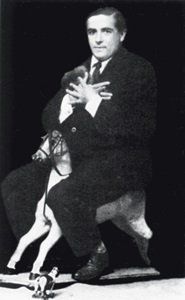
Francis Picabia (22 januari 1879 – 30 november 1953)
De Britse schrijfster en actrice Mary Hayley Bell werd geboren op 22 januari 1911 in Shanghai. Zie ook alle tags voorMary Hayley Bell op dit blog.
Uit:Whistle Down the Wind
“I am ten, and they call me Brat.
Of course, that isn’t my right name, nobody could be christened with a name like that.
All our lousy first names are birds’ names. Don’t ask me why. I imagine our mother was keen on birds and flying, though I don’t know much about her. She flew off some years ago with this character called Peregrine. She lives in South Africa on a different kind of farm, and once in a way we get a Christmas card – which is quite useful as we keep the stamp. »
(…)
Now we’re on the subject of grown-ups, generally speaking I think they’re mad.
I prefer kids, I do really.
Grown-ups kill me. They make so much out of nothing and all that drink turns them into idiots, laughing at nothing at all.
I often wonder if they realise how awful they smell when they kiss you goodnight. Swallow and Poor Baby and me we reel, but reel, against the stairs after we’ve said goodnight.
As I said, I prefer kids. They’re more balanced; I mean, they really are. You see these grown-ups, heavy and downhearted about taxis and the state of the world.
“Why do they take a taxi?” Poor Baby says – and he’s right.”
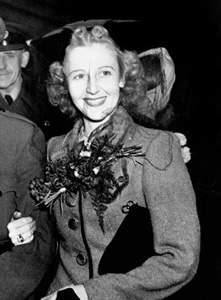
Mary Hayley Bell (22 januari 1911 – 1 december 2005)
De Franse schrijver en regisseur René Charles Guilbert de Pixérécourt werd geboren op 22 januari 1773 in Nancy. Zie ook alle tags voor Guilbert de Pixérécourt op dit blog.
Uit: Robinson Crusoé
"OCROLY, passant d'abord la tête hors de l'arbre, puis une jambe après l'autre et enfin tout le corps.
Ouf !... J'espère que je l'ai échappé belle. Il me semble que tout ceci prend une vilaine tournure ; en tout cas, je ferai mon possible pour m'en tirer sans déficit. J'entends du bruit... vite... à l'observatoire.
(Il rentre dans l'arbre.)
JAMES, aux matelots.
C'est à peu prés de cette direction que sont partis les coups de fusil que nous avons entendus c'est ici ce me semble que nous avons laissé Ocroly.
OCROLY, par le trou.
(A part. )
C'est James.
( Haut. )
Me voici.
JAMES.
Où donc ?
OCROLY, par le trou.
Ici. Regardez s'il n'y a personne sur les arbres d'alentour.
JAMES.
Non, personne. Mais que fais-tu donc là dedans ?
OCROLY, sortant tout à fait.
Chut !
(Il les amène mystérieusement au-devant de la scène et leur parle à voix basse. )
Voyez-vous là bas cet homme qui ne ressemble pas mal à un o.... - o..... ? eh bien ! c'est précisément le mari d'Emma...
TOUS.
Robinson ?
OCROLY.
Lui-même ! c'est le diable, je crois, qui nous a conduits dans cette île. Le Capitaine est libre ; Atkins est entre leurs mains et Dieu sait ce qu'ils vont en faire. J'ai tout vu, tout entendu. Leur projet est de s'emparer de la chaloupe et de... "
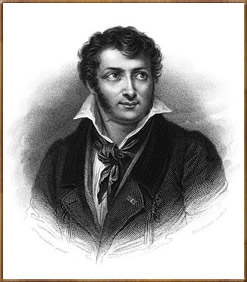
Guilbert de Pixérécourt (22 januari 1773 – 27 juli 1844)
Gravure door Nosselmann, naar een schilderij vam Mme de Cheradame, 1841
De Britse schrijver, filosoof en politicus Sir Francis Bacon werd geboren op 22 januari 1561 in Londen. Zie ook alle tags voor Sir Francis Bacon op dit blog.
Sing A New Song
O sing a new song, to our God above,
Avoid profane ones, 'tis for holy choir:
Let Israel sing song of holy love
To him that made them, with their hearts on fire:
Let Zion's sons life up their voice, and sing
Carols and anthems to their heavenly king.
Let not your voice alone his praise forth tell,
But move withal, and praise him in the dance;
Cymbals and harps, let them be tuned well,
'Tis he that doth the poor's estate advance:
Do this not only on the solemn days,
But on your secret beds you spirits raise.
O let the saints bear in their mouth his praise,
And a two-edged sword drawn in their hand,
Therewith for to revenge the former days,
Upon all nations, that their zeal withstand;
To bind their kings in chains of iron strong,
And manacle their nobles for their wrong.
Expect the time, for 'tis decreed in heaven,
Such honor shall unto his saints be given.
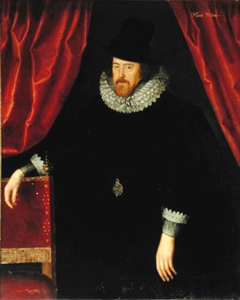
Sir Francis Bacon (22 januari 1561 – 9 april 1626)
Portret door William Larkin, 1610
De Italiaanse schrijver en politicus Antonio Gramsci werd geboren op 22 januari 1891 in Ales op Sardinië. Zie ook alle tags voor Antonio Gramsci op dit blog.
Uit: Prison Notebooks (The intellectuals)
“In Russia various features: the political and economico-commercial organisation was created by the Norman (Varangians), and religious organisation by the Byzantine Greeks. In a later period the Germans and the French brought to Russia the European experience and gave a first consistent skeleton to the protoplasm of Russian history. National forces were inert, passive and receptive, but perhaps precisely for this reason they assimilated completely the foreign influences and the foreigners themselves, Russifying them. In the more recent historical period we find the opposite phenomenon. An élite consisting of some of the most active, energetic, enterprising and disciplined members of the society emigrates abroad and assimilates the culture and historical experiences of the most advanced countries of the West, without however losing the most essential characteristics of its own nationality, that is to say without breaking its sentimental and historical links with its own people. Having thus performed its intellectual apprenticeship it returns to its own country and compels the people to an enforced awakening, skipping historical stages in the process. The difference between this élite and that imported from Germany (by Peter the Great, for example) lies in its essentially national-popular character. It could not be assimilated by the inert passivity of the Russian people, because it was itself an energetic reaction of Russia to her own historical inertia.
On another terrain, and in very different conditions of time and place, the Russian phenomenon can be compared to the birth of the American nation (in the United States). The Anglo-Saxon immigrants are themselves an intellectual, but more especially a moral, élite. I am talking, naturally, of the first immigrants, the pioneers, protagonists of the political and religious struggles in England, defeated but not humiliated or laid low in their country of origin."
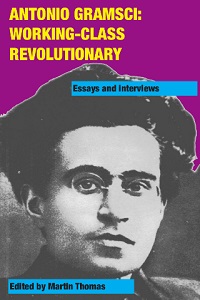
Antonio Gramsci (22 januari 1891 – 27 april 1937)
Cover
|



